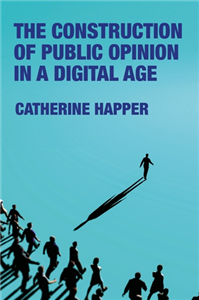The construction of public opinion in a digital age
by Catherine Happer
Description
More Information
Rights Information
Albania, Algeria, Angola, Argentina, Armenia, Australia, Austria, Bahrain, Belgium, Belize, Benin, Bolivia, Bosnia and Herzegovina, Botswana, Brazil, Bulgaria, Burkina Faso, Burundi, Cameroon, Canada, Cape Verde, Central African Republic, Chad, Chile, China, Colombia, Comoros, Congo [DRC], Congo, Republic of the, Costa Rica, Ivory Coast, Croatia, Czech Republic, Denmark, Djibouti, Ecuador, Egypt, El Salvador, Equatorial Guinea, Eritrea, Estonia, Ethiopia, Faroe Islands, Finland, France, French Guiana, Gabon, Gambia, Georgia, Germany, Ghana, Greece, Guatemala, Guinea, Guinea-Bissau, Guyana, Honduras, Hongkong, Hungary, Iceland, India, Indonesia, Iran, Iraq, Ireland, Israel, Italy, Japan, Jordan, Kazakhstan, Kenya, Kuwait, Latvia, Lebanon, Lesotho, Liberia, Libya, Lithuania, Luxembourg, Macau, China, Macedonia [FYROM], Madagascar, Malawi, Malaysia, Mali, Malta, Mauritania, Mauritius, Mayotte, Mexico, Mongolia, Montenegro, Morocco, Mozambique, Namibia, Netherlands, New Zealand, Nicaragua, Niger, Nigeria, Norway, Oman, Pakistan, Panama, Paraguay, Peru, Philippines, Poland, Portugal, Puerto Rico, Qatar, Reunion, Romania, Russia, Rwanda, Saint Helena, Sao Tome and Principe, Saudi Arabia, Senegal, Serbia, Seychelles, Sierra Leone, Singapore, Slovakia, Slovenia, Somalia, South Africa, South Korea, Spain, Sri Lanka, Sudan, Suriname, Swaziland, Sweden, Switzerland, Syria, Taiwan, Tanzania, Thailand, Timor-Leste, Togo, Tokelau, Tunisia, Turkey, Uganda, Ukraine, United Arab Emirates, United Kingdom, United States, Uruguay, Venezuela, Vietnam, Western Sahara, Yemen, Zambia, Zimbabwe, South Sudan, Cyprus, Palestine, Bangladesh, Cambodia, Liechtenstein, Azerbaijan, Jamaica, Kyrgyzstan, Dominican Republic, Myanmar, Monaco
Endorsements
'Poised to become a cornerstone in media and audience studies, Happer's book offers a ground-breaking model for understanding how demands for change are accommodated into systems of power.' Giuliana Tiripelli, De Montfort University 'This elegantly written book offers an empirically rich examination of the media's influence on public opinion and social change in the context of public disaffection and a transformed media landscape.' James Curran, Goldsmiths, University of London This book presents an innovative new model for understanding how media and communications interact with politics, culture and everyday experience to construct people's ideas and opinions. It locates these processes in a time of constant political crisis, when new technologies are changing how we access information and questions of 'truth' and 'reality' are being radically reworked. The book identifies a growing disconnect between an increasingly centralised media and political class and the public it serves - ripe for exploitation by rightwing political actors but ultimately in the hands of the global tech corporations who control the digital space. Drawing on a decade of empirical research, this ambitious book demonstrates the role of demographics, identity groupings and socio-economic conditions in producing patterns in opinion. With an emphasis on the importance of language, value systems and differentiated media cultures - from BBC News to TikTok shorts - it offers new insights into whether age is replacing class as the key marker of political divisions. The construction of public opinion explores how new mechanisms for controlling thought and opinion limit the potential for social change - and how this might be resisted.
Reviews
'Poised to become a cornerstone in media and audience studies, Happer's book offers a ground-breaking model for understanding how demands for change are accommodated into systems of power.' Giuliana Tiripelli, De Montfort University 'This elegantly written book offers an empirically rich examination of the media's influence on public opinion and social change in the context of public disaffection and a transformed media landscape.' James Curran, Goldsmiths, University of London This book presents an innovative new model for understanding how media and communications interact with politics, culture and everyday experience to construct people's ideas and opinions. It locates these processes in a time of constant political crisis, when new technologies are changing how we access information and questions of 'truth' and 'reality' are being radically reworked. The book identifies a growing disconnect between an increasingly centralised media and political class and the public it serves - ripe for exploitation by rightwing political actors but ultimately in the hands of the global tech corporations who control the digital space. Drawing on a decade of empirical research, this ambitious book demonstrates the role of demographics, identity groupings and socio-economic conditions in producing patterns in opinion. With an emphasis on the importance of language, value systems and differentiated media cultures - from BBC News to TikTok shorts - it offers new insights into whether age is replacing class as the key marker of political divisions. The construction of public opinion explores how new mechanisms for controlling thought and opinion limit the potential for social change - and how this might be resisted.
Author Biography
Catherine Happer is Senior Lecturer in Sociology at the University of Glasgow and Director of the Glasgow University Media Group.
Manchester University Press
Manchester University Press is a leading UK publisher known for excellent research in the humanities and social sciences.
View all titlesBibliographic Information
- Publisher Manchester University Press
- Publication Date December 2024
- Orginal LanguageEnglish
- ISBN/Identifier 9781526180223 / 1526180227
- Publication Country or regionUnited Kingdom
- FormatPrint PDF
- Pages224
- ReadershipGeneral/trade; College/higher education; Professional and scholarly
- Publish StatusPublished
- Dimensions234 X 156 mm
- Biblio NotesDerived from Proprietary 6235
- Reference Code16520
Manchester University Press has chosen to review this offer before it proceeds.
You will receive an email update that will bring you back to complete the process.
You can also check the status in the My Offers area

Please wait while the payment is being prepared.
Do not close this window.



